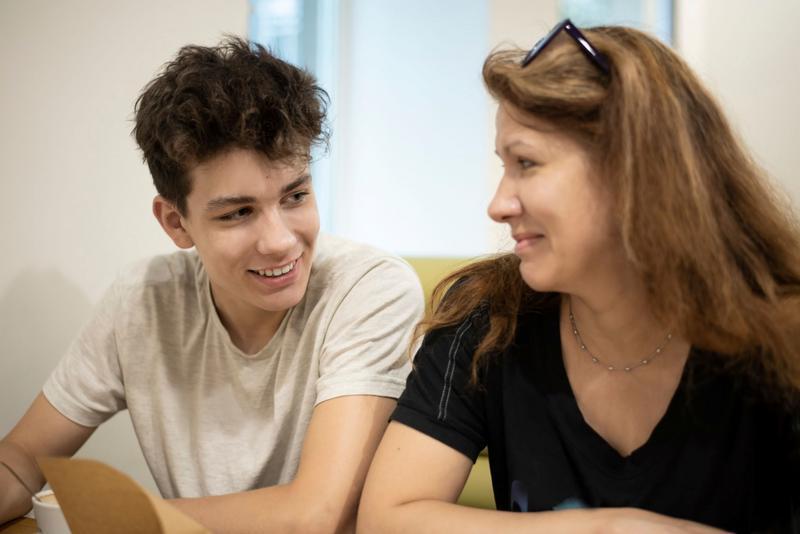As a student prepares to leave for college, parents generally fall into one of two categories: "My baby is leaving the nest and I'm really nervous!" and/or "We now have an empty nest; finally, some alone time!"
As your child
transitions from high school to college, it's common for parents to have worries about their young adult being on their own for the first time. Once your student leaves for college, it can become one of the most
challenging times as a parent.
Your college freshman will have plenty of newfound freedom and you won't be able to see him or her as often.
You also have concerns about how your student is handling their freshman year being away from home for the first time, how settling in is going, and whether he or she is adjusting to college life.
All of that is completely understandable; however, to allow
your college kid to grow to his or her full potential as an individual, he or she may have to deal with some new and different situations during their college years without running to you (at least as a first option).
Here are some tips on how to successfully parent your college student:
Let Go
Letting go isn't easy. Take confidence in the fact that you have raised a mature student who you can trust to make smart decisions.
Your student needs this to learn how to live independently and deal with life as it comes on his or her own.
He or she will always know that you are just a text message or phone call away, should something become too difficult to handle.
Stay in Touch (But Not Too Much)
It's important for your student to become immersed in college life without you calling every hour on the hour.
However, he or she is adjusting to a new life, also, and will likely need someone to discuss all the recent changes with. Be open to talking to (but, don't force) them about how they are adjusting.
If it seems like they aren't opening up to you, encourage them to talk to someone they trust. Let them know that you are there to talk, without judgment, no matter what the issue may be.
Mistakes Happen
Allow your student to make his or her own mistakes and be fully aware that he or she
will make mistakes. A parent's
support and encouragement can go a LONG way.
Obviously, nobody is perfect. Who your student was in grade school and high school may not necessarily determine who he or she becomes in college – people make all sorts of decisions when independence is suddenly thrust upon them.
Simply encourage that he or she stay true to themselves and, as you keep in contact with them, try to check in on their grade progress and behavioral changes to ensure everything is under control (without being
controlling - you just want to
make sure they're safe).
Many students have difficulty adjusting to college courses and their grades suffer as a result. Students who are over-achievers or who were straight-A students in high school can have difficulty accepting such realities.
Focus on your student's efforts and not on the grades, letting him or her know that if he or she is trying her best, you are always going to be proud.
Often, the stress of disappointing a parent is at the root of a student's anxieties (without the parent even realizing it) and a parent's words of comfort can make all the difference in the world.
Don't Visit Too Often
If your student happens to attend a school that's not too far away, you will likely be tempted to visit frequently. Limit your visits to not more than one per month and, when you do visit, ask what they would like to do.
Ensure that you make plans beforehand instead of just dropping by for a visit. This shows that you respect their new lifestyle as you would any other adult who may have plans.
Remember most colleges have a family weekend a month or so after college starts. Students and families get to participate in many activities, and you'll have the chance to meet their friends.
Don't Pressure Them to Come Home All the Time
Like visiting too often, you want your student to get the full college life experience. You certainly will miss your son or daughter but pressuring them to come home every weekend is not advisable.
If they want to come home from college frequently on the weekends, encourage them to stay on campus, instead. Students who stay on campus for classes only and constantly return home tend to enjoy college less because they aren't as tied to the campus or the campus community.
Encourage them to get involved in campus clubs and activities to get to know some other students. Find ways to keep the
keep the homesickness at bay and to bring the comfort of home to their dorm room with décor or photos. This will help to resolve the issue of them wanting to come home every weekend.
Avoid Too Much Advice
Your student will likely get frustrated and complain to you about a lot of different things in college, from annoying roommates to
studying to
finances and beyond.
They likely just want someone to listen and someone to vent to – not someone to tell them what to do. A parenting
blog from Grown and Flown adds, you're investing in more than their college education; you have provided the tools to help them become
confident and independent adults making their own smart decisions—this involves mastering positive interpersonal and problem-solving skills.
In order to avoid a fight, lend an ear and let them know you are there to help should they ever need advice on dealing with any issues. That way, they'll know that you're ready to give advice if they ask for it and you don't come across as the bossy parent.
When you do decide to give advice, make sure you're talking
to them and not
at them - the latter can cause anyone to shut out advice. (Hint: Try thinking of how your parents gave you advice regarding raising kids, etc. What helped and what annoyed you most? Take those factors into account when talking to your student.)
Keep this rule of thumb in mind: if they're not in danger, there's no reason to become meddlesome (unless they ask).
Give Space
Many students often feel that they have less space from their parents when they leave for college than when they lived at home. While a parent's constant concern is well-intentioned, the overbearing actions aren't doing the students any favors and often result in tension in the relationship.
Allow your student to have the time and space necessary to adjust and to have that true college experience. Even just a quick text message check-in every other day or so will show you are thinking of them and are
there for support if and whenever they may need it.
All of this, compiled with unconditional love (and, perhaps, some
care packages) and you and your student will remain closer than ever before!

